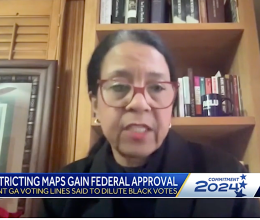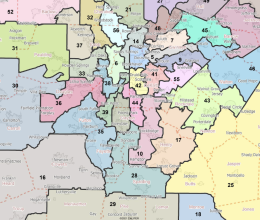In September, we proved that Georgia's Senate and House maps diluted Black voting power in specific areas of the State like South Metro Atlanta. Today, we went to Court to object to proposed remedial maps passed by the General Assembly for the simple reason that they provide no relief to Black voters who are suffering from vote dilution.
On the law, we argue that a remedy for vote dilution must be complete, localized, and must change the political reality for Black voters in the specific areas where vote dilution is occurring. It must add new political opportunities for Black voters in places like South Metro Atlanta. Just renumbering districts is not enough.
And on the facts, we can prove, and did prove, that the State's Proposed Plans do not provide new opportunities for Black voters in specific areas like South Metro Atlanta to elect candidates if their choice. The numbers tell the story, and the story is most stark in the Senate Plan.
The Court ordered the State to create two new Black-majority opportunity districts for Black voters in South Metro Atlanta. A Senate District is 190,000 people. And yet, across the Senate Map, in South Metro area, the net increase in Black voters in Black-majority districts is less than 3,000 people. In the key counties that were the focus at trial, there was either no change (as in Fayette and Spalding counties) or small changes that were offset by "removing" other Black voters from Black-majority districts (as in Henry and Newton counties). The bottom line is that the political reality that Black voters face in South Metro Atlanta under the Senate Plans--vote dilution--does not change.
The numbers also show that the State did change the political reality for Black voters in other places--specifically places that were not the subject of the trial and where there was no finding of vote dilution and no Court order to remedy it. Almost 100,000 Black voters were added to Black majority districts outside the South Metro area, in Cobb, North Fulton, and North DeKalb. But those changes don't do anything for Black voters in South Metro Atlanta. Those changes are not and cannot be a remedy for vote dilution that is harming voters in South Metro Atlanta.
And the same numbers tell a similar story with respect to the Proposed House Plan, especially in Metro Atlanta. In the South Metro and West Metro areas, where the State was ordered to draw three additional Black-majority opportunity districts, the numbers show that the net increase of Black voters in Black-majority districts is less than 10,000 people overall. Meanwhile more than three times that many Black voters are moved into Black-majority districts in other areas, primarily in North Atlanta; 8,500 in DeKalb alone, 13,000 in Cobb, and 15,000 in Gwinnett.
Our argument doesn't depend on partisanship and it doesn't require any restriction on legitimate state policymaking. We are asking only for maps that add new opportunity districts for Black voters in the areas where vote dilution is occurring, like the South Metro. Not just relabeling the districts in those areas--new opportunities that change the political reality for Black voters, which is what the Court's order and Section 2 require. And the numbers conclusively show that the Proposed Plans just don't do that.
The American Civil Liberties Union, the ACLU of Georgia, and WilmerHale represent plaintiffs in Alpha Phi Alpha Fraternity Inc. v. Raffensperger




